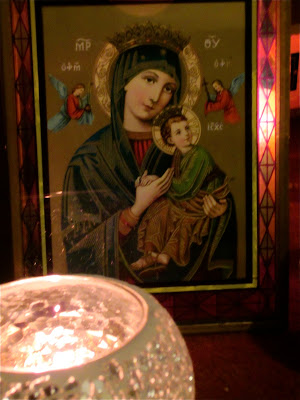A fair amount of information about Francis is found here. Francis is one of those saints that many people feel close to and comfortable with; especially through his dedication as patron saint of animals and the fondness that many people have for members of the Franciscan order. The deeper truth of Francis is much more challenging and a willingness to follow after Francis asks for a sacrifice of desire of everything except the desire for God. I have been blessed to walk the streets and lanes of Assisi and the countryside where he found his refuge and his inspiration. The faith of the followers of Francis and Clare has soaked into the land and left their mark. Even the olive trees have a story to tell. The blessings of the Feast:-
Assisi - Walk from San Damiano to Rivo Torto
The afternoon sun raises a shimmering heat haze through the parched olive groves. Conspiring old hags, the ancient groves reveal their own vision in answer at my musings.
Ancient? Indeed we are ancient; twisted arthritic creatures, old even when Francis walked this way with his brothers; old when Chiara left through the door of the dead for a life much less ordinary.
Some of us kin to the groves of Gethsemane; to that garden where the Christ found a refuge for his tears; where the treachery began; in faith, our lives spanning your faith. And in our lives -a parable.
Across the ages, from Christ to Francis to the moment we rest in – we have been a birthplace for life; for sunlit sustenance; for the food of angels, Olives, a treasure and a fundamental part of life in this place; food and drink; a bowl of olives, good bread – virgin oil – a feast for the senses.
Each year, this harvest comes again - a new birth - a new gift. For us new life comes from the newly alive. The olives ripen only on this season’s wood. And we are mad with the power of fertility. Left to ourselves in the delight of sun and rain; we sprout and shoot and become a riot of fecundity, overgrown, entangled, unmanageable – until our branches collapse from lack of water and weight of the fruit – until the winter winds tear our hearts out.
It is through need that we submit to the shears and pruning knife; branches that are cut hard, cut back into our lichen covered, ancient, seemingly decrepit torsos, wherein lies the taproot of memory, of truth, of rebirth. And there we begin again.
And here is the crux of our tale.
Your faith, childlike, seeks attention, new experience. Prosperity puts authority before service. You are meant to be poor but desire riches; you are meant to be vulnerable but want power. You become blinded by the immediacy and desire of the flesh. You think 'if there was only another path' but there is only one path.
That is why you need this place; like us you need the sharp reminder of the knife; to stir the roots ; to be taken back to the Word; to loose the trappings of the world; to begin again. As Chiara and Francis did, as your Celtic brothers and sisters did. To rebuild a church of souls. Our words to you – return to the source, walk in their footsteps, follow the Way.
wordinthehand2012



























